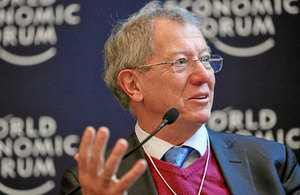UK-China scientists deepen understanding of climate change risks
The climate risks workshop was held in Beijing on 19 and 20 January.

Special Representative for Climate Change, Sir David King
With support from the UK’s Foreign and Commonwealth Office, an expert workshop on application of best practice in risk assessment to climate science was held in Beijing. Some of the world’s leading scientists and experts attended the workshop to discuss the risks of climate change and how these can be reduced.
Participants in the workshop included Sir David King, the UK’s Climate Change Ambassador; Professor He Jiankun from Tsinghua University; Professor Zhou Dadi from China’s Energy Research Institute; Professor Dan Schrag, Director of Harvard University’s Centre for the Environment; Dr Arunabha Ghosh, CEO of the Indian Council on Energy, Environment and Water; Professor Jose Marengo, from Brazil’s National Center for Early Warning and Monitoring of Natural Disasters; and David Hare, President of the UK’s Institute and Faculty of Actuaries.
This formed part of a unique series of meetings, bringing together some of the world’s most eminent experts to assess the risks posed by climate change to people, cities, countries and the world we inhabit, and how these can be reduced. The academic exchange in Beijing follows a similar meeting in Harvard University, and will be followed by events in India and the UK.
The experts applied principles of risk assessment used in fields such as finance, security, and public health to their understanding of climate science. They considered not only what impacts of climate change were most likely, but also what the most severe impacts could be, and whether there might be limits in our ability to adapt to them.
The experts’ findings included:
-
climate change presents a risk: to people’s lives, to cities’ infrastructure, and to countries’ development. Societies need to understand that risk if they are to protect themselves
-
the risks of climate change may be understood in terms of thresholds that could be crossed: high temperatures that exceed the tolerance of crops, causing crop failure; high levels of heat and humidity that exceed the tolerance of people, making it increasingly difficult to work or survive outdoors; and high rates of sea level rise that exceed coastal cities’ ability to protect themselves against flooding
-
the likelihood of crossing these thresholds will depend on how fast the climate changes, and on how successful we are at adapting to it. If global emissions of greenhouse gases keep growing, making the climate change quickly, then the likelihood of crossing these thresholds could increase rapidly over time, at great cost to society. So managing global emissions is an essential part of managing these risks
Speaking at the workshop, Sir David King said:
If we consider only the most likely scenarios for climate change, then however concerning those are, we will be underestimating the scale of the threat. If, as in other fields of risk assessment, we consider the full range of possibilities including plausible worst case scenarios, then we can quickly see that the risks of climate change are enormous.
The work that we have done here with colleagues from around the world has deepened our understanding of those risks, and has thereby put us in a stronger position to determine an appropriate response.